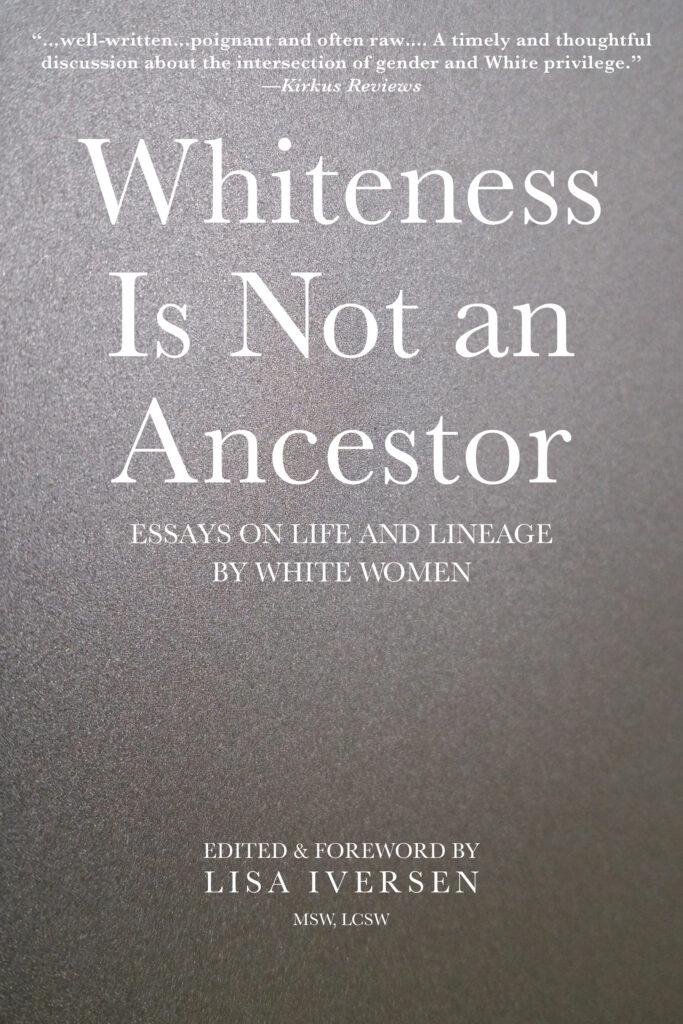Whiteness Is Not An Ancestor
Essays on Life and Lineage by white Women
Published October 13, 2020
“A timely and thoughtful discussion about the intersection of gender and White privilege.” – Kirkus Reviews
Using the lens of inherited trauma and family history, Whiteness Is Not an Ancestor offers a hopeful, humanizing path for dismantling whiteness.
For over two decades, family constellations facilitator and therapist Lisa Iversen has been working with groups, including descendants of ancestors who have perpetrated harm or been victimized in circumstances of injustice. In this collection of essays, she brings together twelve white women who explore the role of whiteness in collective movements of immigration, colonialism, slavery, and war. Through genealogical research, family documents, and deep reflection, these writers from the US, Canada, and the UK disentangle themes of innocence, grief, race, privilege, and belonging in their families and ancestries.
Each essayist shares moving stories and anecdotes from their life, adding historical and cultural context to current conversations about white women’s role in creating and sustaining whiteness.
“This collection of 12 personal essays represents brave explorations of their relationships to whiteness via different aspects of their histories and heritages. The essays provide a fascinating look at whiteness through the lenses of American racism and Jewish Americans; the Swiss and Nazi collaborations; displacement by war; relationship to unceded tribal Native lands; and German ethnicity and reparations. This book is a good reminder for Americans that whiteness may be expressed differently depending on the country and culture, but has always been associated with privilege and oppression.” – Patricia L. Dawson, MD, PhD, FACS, Medical Director, Office of Healthcare Equity, UW Medicine
Whiteness Is Not an Ancestor will appeal to those ready to engage with the difficult truths of history, those interested in healing collective historic trauma and dismantling racism, therapists and family counselors, and all concerned about the fate of democratic nations sourced in whiteness. Each essay includes sources and resources for more information.
Essays by Sonya Lea, Karin Konstantynowicz, Anne Hayden, Summer Starr, Kate Regan, June BlueSpruce, Sabine Olsen, Carole Harmon, Christina Greené, Sharon Halfnight, Una Suseli O’Connell, Pam Emerson. Edited and Foreword by Lisa Iversen.
Reviews for Whiteness is Not an Ancestor
“To even consider to look into the mirror of history without looking away from the face of the perpetrator takes tremendous courage. Each and every woman in this book started the painful process of looking, simply looking at themselves and their family’s history. This book is a rare and necessary document.”
Daan van Kampenhout, author of Tears of the Ancestors – Victims and Perpetrators in the Tribal Soul
“This is a profoundly important book of essays by white women in which the writers face the realities of their own history—the lives and hurtful actions, even atrocities, of the white ancestors who gave them life. One writer’s ancestors were hard-working Kentucky farm people who helped to perpetrate and took enjoyment from the lynching of a Black man. Another’s were a proud Colorado family, descended from pioneers, whose revered ancestor was the governor responsible for the Sand Creek Massacre. Another came from people persecuted in pogroms and by the Nazis, who immigrated to North America and made adjustments to assimilate into white society, with no intention of harm to others. This complicated the writer’s relationship to past trauma and she comes to realize how many specific doors were opened in her own professional and personal life due to her assimilated non-Jewish family name and white skin, and the meaning of this for persons of color. With compassion and grace, these writers bear witness to the ways in which they themselves carry and have benefitted from the systemic racism that plagues our society. Their core insight is that healing does not grow from denial, or from distancing from those who gave them life, or from claiming innocence. Their reckonings full of pain, love, and new awareness allow them to align their lives and actions to their own values of deep respect for all others and for the earth. These lucid essays provide clarity and insight without a shred of self-hatred. They point the way toward a better future for us all.”
Priscilla Long, author of Fire and Stone: Where Do We Come From? What Are We? Where Are We Going?
